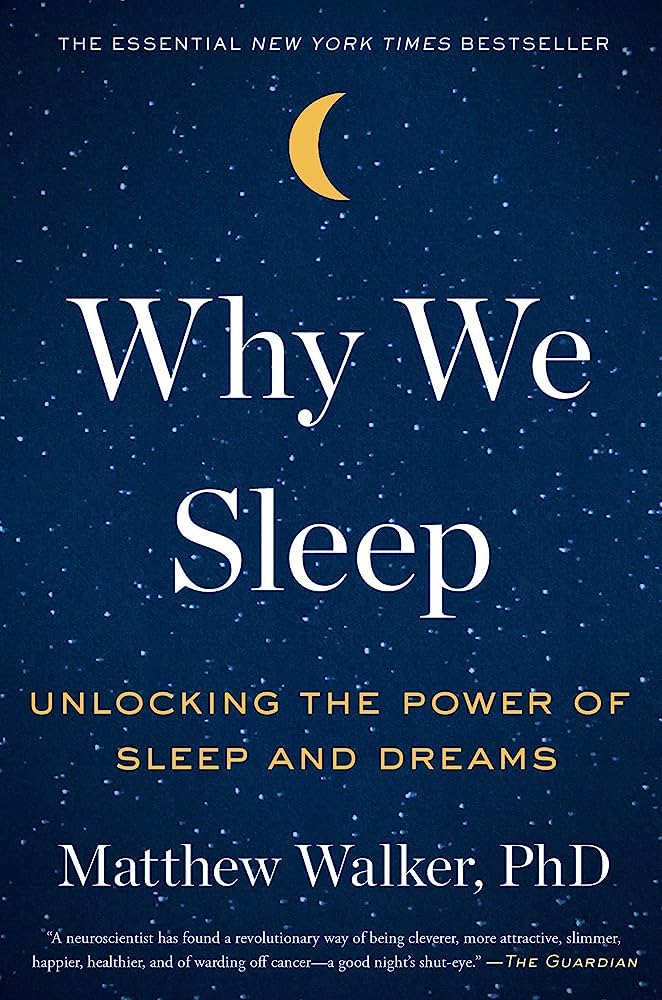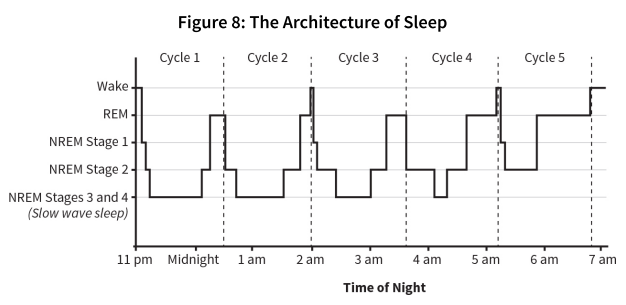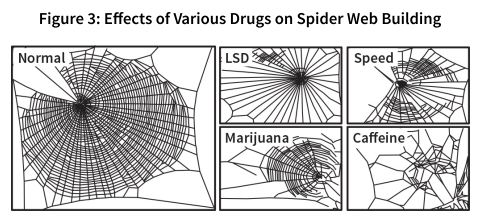Why We Sleep by Matthew Walker — Book Summary and Notes
When did life start sleeping? What if sleep is so helpful that the real question is: Why did life ever bother to wake up?
When did life start sleeping? What if sleep is so helpful that the real question is: Why did life ever bother to wake up?
Routinely sleeping less than six hours a night demolishes your immune system, more than doubles the risk of cancer, disrupts blood sugar levels, increases the likelihood of cardiovascular disease, stroke, and congestive heart failure, and contributors to all primary psychiatric conditions, including depression and anxiety.
Are there any biological functions that do NOT benefit from sleep?
In Why We Sleep, Neuroscientist Matthew Walker breaks down scientific breakthroughs on sleep research, providing insight on how sleep affects our cognitive and physical performance in the short and long term, and what you can do improve your own sleep quality.
- Part 1: What is Sleep and What it isn’t
- Part 2: The Good, The Bad, and The Deathly of Sleep Loss
- Part 3: The Fantastical World of Dreams
- Part 4: Sleeping Disorders

Why We Sleep
Unlocking The Power of Sleep and Dreams By Matthew Walker
Part 1
What is Sleep and What it isn’t
What is Sleep?
A loss of external awareness? A sense of time distortion?
While you are no longer conscious of all that surrounds you, your ears are still “hearing,” and your eyes are still “seeing”. All these signals still flood your brain, but it is here, in the sensory convergence zone, where that journey ends while you are asleep. A perceptual barricade set up in the thalamus imposes a sensory blackout in the brain that prevents signals from traveling to the cortex.
Although your conscious mapping of time is lost during sleep, your brain continues to catalog time with incredible precision at a non-conscious level. Remember that time you had to catch an early-morning flight? Before bed, you set up your alarm for 6:00 a.m. Miraculously, however, you woke up at 5:57 a.m., unassisted, just before the alarm.
The Circadian Rhythm
When cut off from the daily cycle of light and dark, humans express a predictable and repeating pattern of prolonged wakefulness (about 15 hours), paired with consolidated rest (about 9 hours of sleep). We routinely experience light from the sun that comes to the rescue of our imprecise, overrunning international circadian clock. Sunlight acts like a thumb on the side dial of an imprecise wristwatch.
The Sleep Cycle
- Wake state is reception (experiencing and constantly learning the world around you)
- NREM sleep is reflection (storing and strengthening those raw ingredients of new facts and skills)
- REM sleep is integration (interconnecting those raw integredients with all past experiences and building an ever more accurate model of how the world works)

A danger resides in this sleep profile, in which NREM sleep dominates early at night, and REM sleep dominates later in the morning. If you go to bed this evening at midnight and wake up at 6 a.m. instead of 8 a.m., what percent of sleep will you lose? The logical answer is 25%, but that’s not entirely true. Since your brain desires most of its REM sleep in the late-morning hours, you may lose 60% to 90% of all your REM asleep, even though you lose 25% of total sleep time.
Short-changing the brain of either NREM or REM sleep—both of which serve different critical functions in the brain and body—results in many physical and mental illnesses.
Night Owls
When a night owl is forced to wake up too early, their prefrontal cortex remains in a disabled “offline” state. However, night owls are not owls by choice. They are bound to a delayed schedule by unavoidable DNA hardwiring. It is not their conscious fault but rather their genetic fate.
The unlevelled playing field of society’s work scheduling is strongly biased toward early start times that punish owls and favor larks. Most unfortunately, owls are more chronically sleep-deprived, having to wake up with the larks but unable to fall asleep until far later in the evening. Owls are thus often forced to burn the proverbial candle on both ends.
Jet Lag
It feels harder to adjust to a new time zone when traveling east than west. By traveling east, you fall asleep earlier; by traveling west, you stay up later, which is a consciously and pragmatically easier prospect. Secondly, eastward travel makes a “day” shorter than 24 hours for your internal circadian rhythm, rendering it more difficult for the mind to simply will into action.
Caffeine
The older we are, the longer it takes our body to remove caffeine. This means that we become more sensitive to the effects of caffeine on disrupting our sleep.

Scientist exposed spiders to different drugs and observed their ability to construct webs under its influence. Like LSD, Speed, and Marijuana, it is striking how incapable the spiders were in constructing anything resembling a logical web under caffeine (Spider Communication: Mechanisms and Ecological Significance: Princeton University Press, 1982).
Am I getting enough sleep?
- After waking up in the morning, could you fall back asleep at ten a.m.?
- Can you function optimally without caffeine before noon?
- If you didn’t set an alarm clock, would you sleep past that time?
- Do you read and reread the same sentence on your computer screen?
- Do you sometimes forget the color of the last few traffic lights while driving?
Can you plan for an upcoming sleep debt by “banking” extra sleep credit beforehand?
REM sleep becomes the primary dish of choice with each returning visit to the recovery buffet table, with a side of NREM sleep added. However, the brain never comes close to getting back all the sleep it has lost, regardless of the recovery. This is true for total sleep time, just as for NREM and REM sleep. Humans can never “sleep back” that which we have previously lost.
What about the aging process so thoroughly robs the brain of this essential state of slumber?
Most sleep doctors consider good-quality sleep to involve a sleep efficiency of 90% or above (defined as when you sleep in bed). However, older individuals suffer a reduction in sleep efficiency. The more severe the deterioration of their brain’s mid-frontal region, the more dramatic their sleep loss.
Part 2
The Good, The Bad, and The Deathly of Sleep Loss
Sleep is the universal health care provider: whatever the physical or mental ailment, sleep has a prescription for it.
Does the learning capacity of the human brain decline with continued time awake across the day? If so, can sleep reverse this saturation effect and restore learning ability?
The more sleep spindles an individual has at night, the greater the restoration of overnight learning ability comes the following day.
Which sleep period would provide a more significant memory savings benefit—that filled with deep NREM or that packed with abundant REM sleep?
For fact-based, early-night rest, rich in deep NREM, gives superior memory retention savings relative to late-night REM sleep.
How long can a human go without sleep before their performance is objectively impaired?
The most common cause of drowsy-driving accidents is microsleep, a momentary lapse in concentration. The effects of sleep loss on concentration are not additive but rather multiplicative. After the first night of no sleep, people’s concentration lapses increased by 400%. These impairments continue to escalate at the same rate after a second and third night of total sleep deprivation.
How many nights of recovery sleep does it take to restore the stable performance of a human after sleep loss?
Sleep for memory consolidation is an all-or-nothing event. Humans’ cognitive performance remains stable for around 16 hours, after which our brain begins to underperform in many cognitive tasks at an exponential rate severely. If you don’t sleep the first night after learning, you lose the chance to consolidate those memories, even if you get lots of “catch-up” sleep afterward.
You Do Not Know How Sleep-Deprived You Are When You Are Sleep-Deprived
- 4 Hours of Sleep for 6 Nights is the same as being sleep deprived for 24 Hours
- 6 Hours of Sleep for 10 Nights is the same as being sleep deprived for 24 Hours
Many people unwittingly spend years of their life in a sub-optimal state of psychological and physiological functioning, never maximizing their potential of mind or body due to their blind persistence in sleeping too little.
Part 3
The Fantastical World of Dreams
Every night you become routinely psychotic.
- When you were dreaming last night, you started to see things that were not there—you were hallucinating
- You believed things that could not possibly be true—you were delusional
- You became confused about time, place, and person—you were disoriented
- You had extreme swings in your emotions—you were affectively labile
- You woke up this morning and forgot most, if not all, of this bizarre dream experience—you were suffering from amnesia.
Is it fair to judge the contents of someone’s dream since they were not the conscious architects?
Many people believed that dreams were simply a by-product of REM sleep. Dreams, like heat energy lost from a lightbulb, may serve no function. If the contents of your dream have no predictive power in determining the benefits of REM sleep, it would suggest that REM sleep alone is sufficient. If, however, you need both REM sleep and to be dreaming about specific contents to obtain certain benefits to the mind and body, a unique combination of REM sleep plus dreaming is needed to take advantage of a good night’s sleep fully.
Overnight Therapy
Rem-sleep Dreaming accomplishes two critical goals.
- To remember the details of those valuable, salient experiences, integrating them with existing knowledge and putting them into autobiographical perspective.
- Sleeping to forget, to dissolve, the visceral, painful emotional charge that had been previously been wrapped around those memories.
How can I understand and connect that which I have recently learned with that I already know, and in doing so, discover new insightful links and revelations?
Part 4
Sleeping Disorders
Some people confuse time slept with sleep opportunity time. The need is not defined by what is obtained but rather by whether that quantity of sleep is sufficient to accomplish all the functions that rest does.
In medicine, sleep deprivation is considered as follows:
- (i) having the adequate ability to sleep; yet
- (ii) giving oneself an inadequate opportunity to sleep.
Insomnia is the opposite:
- (i) suffering from an inadequate ability to get good quality sleep; despite
- (ii) allowing oneself the adequate opportunity to sleep.
Sleep Procrastination
- Constant exposure to artificial lighting (LED lights)
- Irregular temperature
- Caffeine consumption
- Alcohol intake
- A history of punching time cards
Sleeping Tips
- Stick to a sleep schedule. Wake up and go to bed at the same time each day.
- Exercise is great, but not too late (no later than 3 hours before bedtime).
- Read a printed book rather than one on an electronic screen.
- Lit your rooms with dimmed yellow lighting instead of blue LED lights.
- Dark bedroom, cool bedroom, and gadget-free bedroom.
- Prepare a 30mins wind-down routine before bed.
- Avoid late-night meals and beverages.
- Take naps before 4 pm.
- Avoid sleeping pills.
